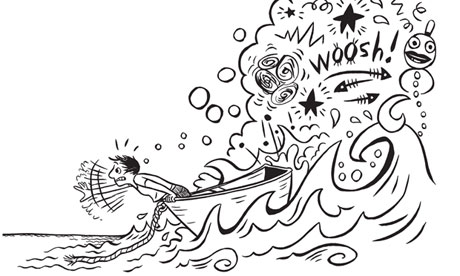
Marbles is a memoir about depression. Ellen Forney is an American cartoonist, so her memoir is told through pictures, though there are often a lot of words in the thought clouds, which itself tells you something about the nature of the illness.
Specifically, Forney has bipolar disorder, so her state of mind swings wildly from curled-up-on-sofa-under-blanket, to let's-all-get-naked-and-have-sex. It is a very engaging book, and Forney has the essential ingredient for a memoir of this type: honesty.
To write a memoir, we are told, involves the ability to betray people. Here the main person Forney betrays is herself, and she does so with wit, irony and pathos. What will be particularly familiar for those who have been through similar experiences is the sense of denial. One speech bubble declares "I don't want balance, I want brilliance! Meds would hold me down!" Meanwhile, on the same page, the sword of Damocles hangs above her head.
Most of the book documents a familiar path, the one signposted the Road to Recovery (or at least stability), though fortunately it never feels too familiar thanks to Forney's representations of her different mental states. For instance, there is a double page where she is planning her book launch, full of busy lines and arrows to indicate a full force brainstorm. A few pages later we see her slipping down again, sliding literally over the edge of a cliff.
Parts are genuinely gripping, as she explores remedies from lithium to yoga. The most powerful images are the drawings she did in her deepest depressions. Some are of hallucinations – faces she sees in her own fingers, for instance – and another is an image of her 1999 self rising from the ashes of the slumped-on-the-floor 1998 Ellen.
These moments are nicely juxtaposed with comic scenes, such as a yoga class where she gets freaked out by the name "corpse pose". A short while later, she starts to get better. After a swimming session she stares at droplets on the wall in the shower and sees in them a night-time festival in the woods, with strings of lights in the trees. "I'd forgotten how I used to see things in other things – and I realised my depression was finally lifting." At one point she hugs a tree, crying with her face pressed into the bark until she has run out of tears.
A question that runs through her mind – and the book – is that old one about whether being bipolar will help her art. So as well as detailed descriptions of meds – too addictive Klonopin, memory-stifling Lithium, weight-gain inducing Zyprexa, orgasm-stopping Tegretal – there are also digressions into the lives of famously depressive artists and writers she admires.
On Van Gogh's art, she wonders: "Was he trying to pin down the confusing swirls inside his head to bring them outside?" She studies that other great paint swirler, Munch, and discovers that he wanted to keep suffering, as he felt rudderless without his depressions. Poignantly, Forney feels guilty that she doesn't want to hang on to her sufferings, and wonders if this makes her a lesser artist.
Is art a consequence of pain? Are the greatest artists simply those with the highest pain threshold, the ones who can stare into the abyss and not flinch as the abyss stares back? Forney considers artists such as Michelangelo, Gauguin and Georgia O'Keefe, as well as writers such as William Styron and Sylvia Plath, whose experiences of depression, she realises with some concern, are similar to her own.
At one point, she becomes disillusioned with the whole "crazy artist" idea. "Sometimes it seems like pain is too obvious a place to turn for inspiration. Pain isn't always deep ... Sometimes it's awful and that's it. Or boring."
The irony here, of course, is that Forney is facing her pain, and due to her honesty and sense of humour Marbles never even gets close to being boring. If you are interested in a disarmingly frank and funny account of the emotional extremes a human mind can reach, you should read this brilliant and strangely life-affirming book.
• Matt Haig's The Humans is published by Canongate. He is appearing at the Edinburgh international book festival on 18 August; edbookfest.co.uk.

